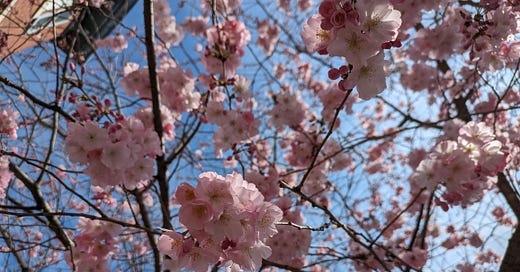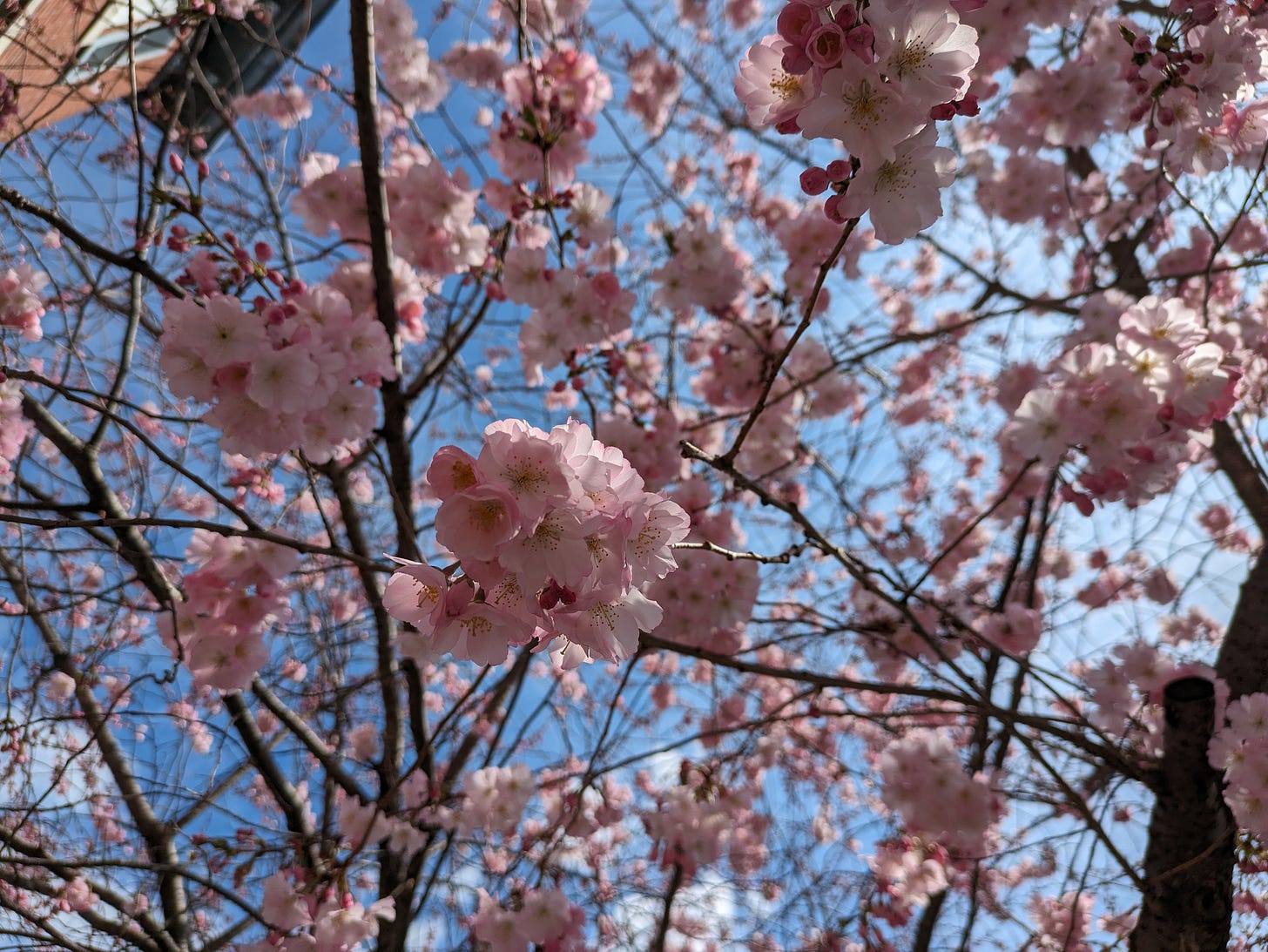Your Attention is a Valuable, Non-renewable Resource
Thoughts on social media culture and a list of affirmations that empower me to pay less attention to my phone.
The title of this essay is a sentiment often discussed in Tarot for the End of Times, a podcast with Sarah Cargill. Sarah’s teachings have cultivated much of my ideas around what our attention and time mean to us. I want to name her as a source of inspiration for this essay.
I’ve been enjoying seeing fellow writers and creatives reflect on the black hole that is social media culture. I feel that there is a growing tide of people across the political spectrum who are tired of constant, unfulfilling phone use. The tech industry is pretty masks-off these days about the intention they put into their products to be more addicting than enriching.
In their recent manifesto “What is to be Done?” CJ the X writes about how hard it is to feel like the state of the internet can be changed. They talk about how easy it is to shrug off the issue with a that’s-just-how-things-are attitude. One of the reasons I follow CJ’s work so closely is that they care about thinking through these problems and finding practical solutions that can be enacted by individuals: “I don’t want to win the game of exploitation, I want to improve the conditions of the game.”
In a recent Wired article titled “The One Internet Hack that Can Save Everything,” Jaron Lanier and Allison Stanger make a case for removing Section 230 from the Communications Decency Act. This section allows platforms to not be held liable for what users say and do on them. Lanier and Stanger argue that this is what created the environment for the economic structure of the internet: “we ended up with the deceptively named ‘advertising’ business model—and a whole society thrust into a 24/7 competition for attention.”
In this context, there is little to no incentive to create digital products that leave the users feeling fulfilled and satisfied. In fact, there is more incentive to create products that cause us to feel intense emotions that keep us logged on. “We have learned that humans are most engaged, at least from an algorithm’s point of view, by rapid-fire emotions related to fight-or-flight responses and other high-stakes interactions.” In an industry with no clear ethical standards, we are at the mercy of the tech giants to decide what products we have to choose from and how they will affect our emotional states.
In “The State of Culture, 2024,” The Honest Broker provides this helpful visual on the perspectives behind our technology:
As humans, we desire to experience and create art. Art is represented by the smallest fish because art has inherent value regardless of the economy. This fish happens to live in our tech-driven capitalist economy. So, the next fish in the food chain is entertainment because the entertainment industry capitalizes on our desire for art.
Entertainment products gain value based on attention spent on them, which is measured by time. For example, social media holds so much value because of how much time we spend using it. Since the economy of the internet is based on mining our data for targeted advertising, companies are incentivized to do whatever it takes to keep our attention online. The more ads we see, the more money they make, with no payout to the users who supply the data being sold. Social media algorithms were created with this goal in mind: they calculate what content is mostly likely to keep us engaged, and then show that content to us. Algorithmically-curated content appears based on what will keep our attention, not necessarily on what we want to be seeing.
This brings us to the next fish on the food chain: “distraction. Or call it scrolling or swiping or wasting time or whatever you want. But it’s not art or entertainment, just ceaseless activity” (Ted Gioia). Distraction is the next fish because algorithms have no sense of quality, which is what many of us seek through our entertainment and what we value about art. Art makes us think about the world, connect with each other, and inspires us. Think of the hours spent on artists’ Tiktoks, or scrolling around streaming services trying to find a good show. We get tastes of the art and quality entertainment we’re looking for within the infinite scroll presented to us.
Another reason we turn to our devices is that we are looking for distraction itself. Mental health issues are on the rise, it’s harder to make friends with new people, an entire pandemic is ongoing, air quality is only getting worse, and our democracy is on a teetering edge. In many ways, we are trying to unwind and distract ourselves from the stressors of our lives, but what we’re given is unsatisfying and exploitative.
Feeling completely satisfied with our internet use is the opposite of what tech companies want because feeling satisfied means we’ll put our devices down. If we do that, they lose money, and we might start demanding more material changes within the systems we live in. The nuggets of good feelings we find on social media are surrounded by dystopian news of world events and conspiracy culture.
It’s easy to feel frozen in place and unable to do anything when all of the problems in the world are at your fingertips 24/7. We’ll spend hours on the internet, sifting through distressing news, seeking those small bursts of dopamine that come from likes, comments, reposts, and positive analytics. This dopamine cycle is the chemical basis of addiction formation. The more time we spend distracting ourselves online, the more we feel reliant on it for the good feelings we aren’t getting offline. In the current structures we live in, making products distracting and addictive is the easiest and most lucrative way to keep our time and attention. Addiction is at the top of the food chain.
I don’t think anyone disagrees that our devices and social media are addicting and it feels impossible to step away from them. I think the addiction model is useful here because it reminds us that it is difficult to break away, and it isn’t a reflection of our characters that we often fail to put down our phones. Negatively judging others or ourselves for struggling with addiction isn’t a kind, gentle, or useful tactic. This is a struggle shared by all of us, so no amount of individual shaming will solve the problem.
None of this is happening by accident - Silicon Valley got rich through keeping our attention on their platforms and devices. Understanding our collective social media use through addiction allows us to build community support around reducing phone/device usage. It is empowering to remember that your attention is a valuable resource. Your time, like the oil powering our energy infrastructure, is non-renewable. Tech companies are extracting our time away from us and the living, breathing world that surrounds us.
Time and attention aren’t the only things being extracted for the infinite gain of tech companies. It is no secret that phones and other devices are built around Planned Obsolescence, meaning they are intended to break quickly or stop being compatible with software updates in a short amount of time. New generations of phones come out every year when they could be designed to last decades.
It takes an incredible amount of resources to produce our technology on such a massive scale every year. The mineral that powers our phones and the “green” economy is cobalt. The Democratic Republic of the Congo produces 70% of the world’s cobalt, and the mining of it is rife with human rights violations. Almost 7 million people have been displaced due to forced evictions and conflicts occurring in the name of cobalt extraction. Even though this is a direct result of their constant demand, tech companies refuse to take accountability for these issues. So, not only are devices designed to break quickly and foster addiction in their users, but they are also driving mass displacement and conditions of slavery in the DRC. These are not individual issues - all of the suffering of the world is interconnected.
Widening our perspective on how these issues tie people together allows us to see the world beyond our screens. Our devices are tools that can be used in as many ways as can be imagined. We use the internet to build social movements, uplift voices, and unveil the deep issues embedded in our systems. Marginalized people use social media to connect to others in life-saving ways. The internet is currently the only place to see what’s happening on-the-ground in the DRC.
CJ the X rightly states that “humanity will not throw away all of the positives that social media has given us, so we cannot outright annihilate social media.” The issue we face now is re-balancing our time, energy, and attention. It will take community effort to shift the internet’s role in our lives and demand more accountability out of the companies creating these products. Quitting social media cold-turkey isn’t going to be the answer for everyone, but weaning ourselves off of it will help us find a healthier dosage.
Some days, it takes me great effort to put my devices down. I am practicing checking-in with myself before getting online and reflecting on the reasons I am using my phone. I want to feel more capable of keeping it off of my person instead of always carrying it with me. One community-based goal I have is to start hosting small gatherings where we all put our phones in a separate room and watch how our connections shift. I have also been trying to keep my phone put away when I’m out in public so I can pay attention to the people and landscape around me. Usually people are on their phones, but I can’t increase my in-person human interactions if I don’t look up.
As I take in the world around me, I see phone addiction as a shared struggle that is framed as an individual one. I see a world full of life that holds inherent value. I watch the buds open on the cherry blossoms and adore the return of the robins. I know that my environment is worthy of my attention. I am ready to re-invest my time.
Affirmations that empower me to put down my phone:
I have control over what I pay attention to.
I spend time on things that reflect my values.
I am enriched by how I spend my free time.
I prioritize meaningful human connection.
I am fully present when I’m with my loved ones.
I am a valued member of my living environment.






Thank you for this insightful perspective. A few years ago a friend was visiting me at my home in Thailand. Leaving a restaurant one evening, he was walking a few yards behind me, his head buried in his phone, expressing wonder at the image of the moon he was seeing on it. I stopped and pointed to the sky. The addiction is real.